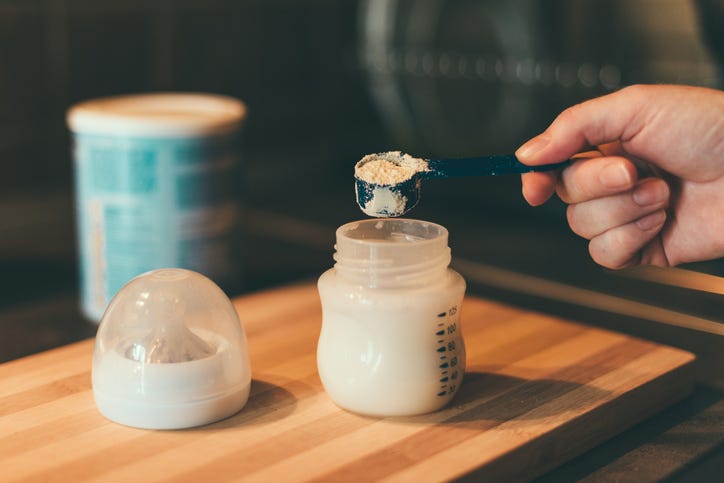
The Food and Drug Administration in February announced a recall for certain Enfamil baby formula that might have been contaminated with Cronobacter sakazakii -- the same deadly bacteria that sparked the massive infant formula recall in 2021 which led to a months-long shortage nationwide.
Now, a new report indicates FDA officials knew that the products were testing positive for the bacteria several months before the recall was issued -- exposing a lag time that potentially exposed infants to the deadly pathogen.
An FDA spokesperson confirmed to Politico that inspectors became aware of the issue that sparked the Enfamil recall back in November.
According to the report, Reckitt, the formula manufacturer, first detected Cronobacter sakazakii in a batch of formula produced at its plant in Zeeland, Michigan in September. While that batch of formula was destroyed, "the FDA later determined that not enough cleaning had been done following the positive test," the report says.
"Two batches of formula made right after the contaminated batch would ultimately be recalled on February 20 — more than five months after the products had been distributed nationally, including in Guam and Puerto Rico," Politico reported.
In issuing the recall, Reckitt said it was out of an abundance of caution and that the products tested negative for contaminants. However, there was no mention of a previous positive test months earlier, nor any specific steps taken afterward to correct the issue. The company simply said, "We have identified the root cause, which was linked to a material from a third party. We have taken all appropriate corrective actions, including no longer sourcing this material from the supplier."
The length of time between the positive test to the recall is unacceptable and shows a lack of urgency, according to Mitzi Baum, CEO of STOP Foodborne Illness, a group that advocates on behalf of victims of outbreaks.
"It's stunning that it's almost identical to what happened in 2021. Lessons have not been learned," Baum told Politico. "FDA continues to be reactive. It's the internal processes that have not been fixed, if this is happening again."
The recall in 2021 was issued after four babies contracted a Cronobacter infection after consuming formula that was produced at Abbott Laboratories' infant formula plant in Sturgis, Michigan -- one of the largest infant formula manufacturing facilities in the country. Two of the infants died. An FDA investigation found numerous safety and health violations that forced the plant to close for several months and had ripple effects across the infant formula supply chain, which was already struggling with global supply issues from the COVID-19 pandemic, resulting in a massive recall and nationwide shortage.
Aside from the Abbott and Reckitt recalls, four additional infant formula recalls have been issued over the past year for Cronobacter contamination --more than in the last decade combined, according to Politico.
Earlier this month, the FDA issued a call to action to baby formula companies to prevent future outbreaks. Since the Abbott recall, the agency said it has taken many steps to "enhance the safety of powdered infant formula through the development of a cronobacter prevention strategy, enhanced inspectional activities, increased engagement with the infant formula industry, and by pursuing regulatory action when appropriate." The FDA urged companies to review their strategy and "take prompt action to improve processes and programs for the protection of infants."
Meantime, House Republicans have launched an investigation into the FDA's handling of the infant formula crisis. In a letter to the FDA commissioner, House Oversight Committee Chairman James Comer, R-Ky., requested documents and communications to understand the agency's response and its restructuring of the food and nutrition division.
Under the restructuring plan, the FDA made no reassignments or firings over its response to the infant formula shortage. Instead the agency now "simply requires certain offices and personnel to report to the newly created position of Deputy Commissioner for Human Foods," the letter said.
"The Committee is concerned that the FDA's restructuring is a superficial attempt -- rather than a real effort -- to bring accountability and make meaningful changes," Comer wrote.
The committee is set to hold its first hearing on FDA's oversight of the formula shortage on Tuesday.


